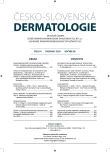-
Medical journals
- Career
Psoriasis Treatment with Adalimumab in Clinical Practice: Long-Term Experience of a Center for Biological Therapy of Psoriasis
Authors: S. Gkalpakiotis 1; E. Adenubiová 1; P. Arenberger 1; P. Gkalpakioti 1; J. Jirčíková 2; M. Arenbergerová 1; T. Doležal 2
Authors‘ workplace: Dermatovenerologická klinika 3. LF UK a FNKV přednosta prof. MUDr. Petr Arenberger, DrSc., MBA 1; Value outcomes, s. r. o. 2
Published in: Čes-slov Derm, 90, 2015, No. 6, p. 238-242
Category: Pharmacologyand Therapy, Clinical Trials
Overview
Psoriasis is a chronic inflammatory skin disease affecting about 2–4% of Central-European population. Treatment options include topical or systemic agents, often in combination. Conventional systemic therapies are represented by phototherapy (UVB, PUVA), methotrexate, cyclosporine and acitretin. The newest drugs are so-called biologics: drugs blocking tumor necrosis factor alpha (TNF alpha) – adalimumab, etanercept, infliximab, drugs blocking interleukin-12 and 23 (IL-12/23) – ustekinumab and newly also drugs blocking interleukin 17 – secukinumab. The aim of this paper is to present the long -term efficacy and safety of treatment of patients with moderate to severe psoriasis with adalimumab, a fully human monoclonal antibody against TNF-alpha. Retrospectively we analyzed 90 patients with moderate to severe psoriasis treated with adalimumab in the Center for biological therapy in Dermatovenereology clinic of the Faculty Hospital of Kralovske Vinohrady during the years 2008 and 2015. Although the average PASI of patients assigned to treatment was 22.5, the results shows a rapid onset of action of adalimumab, where PASI75 was observed in 85.6% of patients after 3 months of treatment. The efficacy sustained even in a long-term follow up, after two years PASI75 has been retained in 94.8% and PASI90 in 75.9% patients. After 48 months follow up a cohort of about 80% of patients is still on therapy. The safety profile of adalimumab in our group was very good, no patients have discontinued the treatment due to adverse events.
Key words:
psoriasis – adalimumab – long-term efficacy
Sources
1. CETKOVSKÁ, P., KOJANOVÁ, M. Česká doporučení k biologické léčbě závažné chronické ložiskové psoriázy. Čes-slov. Derm., 87, 2012, 1, p. 1–30.
2. CHRISTOPHERS, E. Comorbidities in psoriasis. J. Eur. Acad. Dermatol. Venerol., 2006, 20, p. 52–55.
3. COHEN, A. D., DREIHER, J., BIRKENFELD, S. Psoriasis associated with ulcerative colitis and Crohn’s disease. J. Eur. Acad. Dermatol. Venerol., 2009, 23, p. 561 – 565.
4. FOTIADOU, C., LAZARIDOU., E, SOTIRIOU, E. et al. Adalimumab for psoriasis in Greece: clinical experience in a tertiary referral centre. J. Eur. Acad. Dermatol. Venereol., 2012, 26, p. 298–303.
5. GKALPAKIOTIS, S., ARENBERGER, P., ADENUBIOVÁ, E. Psychosociální aspekty života pacientů s psoriázou v České republice. Čes-slov, Derm., 2013, 4, p. 189–196.
6. GORDON, K., PAPP, K., POULIN, Y. et al. Long - term efficacy and safety of adalimumab in patients with moderate to severe psoriasis treated continuously over 3 years: results from an open-label extension study for patients from REVEAL. J. Am. Acad. Dermatol., 2012, 66, 2, p. 241–51.
7. HARTZ, A., MARSH, J. L. Methodologic issues in observational studies. Clin. Orthop. Relat. Res., 2003, 413, p. 33–42.
8. LANGLEY, R. G., ELLIS, C. N. Evaluating psoriasis with Psoriasis Area and Severity Index, Psoriasis Global Assessment, and Lattice System Physician’s Global Assessment. J. Am. Acad. Dermatol., 2004, 51, p. 563–569.
9. MENTER, A., GRIFFITHS, C. E. Current and future management of psoriasis. Lancet, 2007, 370, p. 272–284.
10. MROWIETZ, U., LEONARDI, CL., GIROLOMONI, G. et al. Secukinumab retreatment-as-needed versus fixed-interval maintenance regimen for moderate to severe plaque psoriasis: A randomized, double-blind, noninferiority trial (SCULPTURE). J. Am. Acad. Dermatol., 2015, 73, 1, p. 27–36.
11. NESTLE, F. O., KAPLAN, D. H., BARKER J. Psoriasis. N. Engl. J. Med., 2009, 361, p. 496–450.
12. PAPP, K., MENTER, A., POULIN Y. et al. Long - term outcomes of interruption and retreatment vs. continuous therapy with adalimumab for psoriasis: subanalysis of REVEAL and the open-label extension
study. J. Eur. Acad. Dermatol. Venereol., 2013, 27, 5, p. 634–642.
13. PATHIRANA, D., ORMEROD, A. D., SAIAG, P. et al. European S3-Guidelines for the systemic treatment of psoriasis vulgaris. J. Eur. Acad. Dermatol. Venereol., 2009, 23, (Suppl. 2), p. 1–70.
14. RYAN, C., KIRBY, B., COLLINS, P. et al. Adalimumab treatment for severe recalcitrant chronic plaque psoriasis. Clin. Exp. Dermatol., 2009, 34, 7, p. 784–788.
15. SCHMITT, J. M., FORD, D. E. Role of depression in quality of life for patients with psoriasis. Dermatology, 2007, 215, p. 17–27.
16. SCHMITT-EGENOLF, M. Psoriasis therapy in real life: the need for registries. Dermatology, 2006, 213, p. 327–330.
17. VAN DE KERKHOF, P. C. Novel biologic therapies in development targeting IL-12/IL-23. J. Eur. Acad. Dermatol., 2010, 24, p. 5–9.
18. ZSCHOCHE, C., BIDIER, M., HADASCHIK, E. Alopecia areata during treatment with adalimumab: therapy with an alternative TNF-alpha inhibitor is possible. J. Dtsch. Dermatol. Ges., 2013, 11, 5, p. 450–453
Labels
Dermatology & STDs Paediatric dermatology & STDs
Article was published inCzech-Slovak Dermatology

2015 Issue 6
Most read in this issue- Up-to-Date Review on Pustular Psoriasis and its Management
-
Keratodermia punctata palmaris et plantaris typ 1:
popis případu matky a dcery - Psoriasis Treatment with Adalimumab in Clinical Practice: Long-Term Experience of a Center for Biological Therapy of Psoriasis
Login#ADS_BOTTOM_SCRIPTS#Forgotten passwordEnter the email address that you registered with. We will send you instructions on how to set a new password.
- Career

